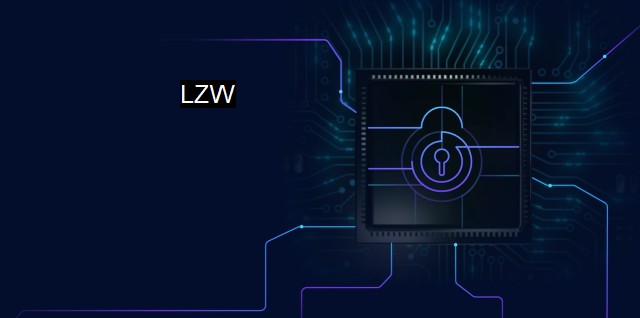What is LZW?
LZW: Enhancing Cybersecurity and Antivirus Measures through Lossless Compression Technique
The LZW (Lempel-Zim-Jacobson-Welch) algorithm is a universal lossless data compression algorithm created by Abraham Lempel, Jacob Ziv, and Terry Welch. This algorithm plays a significant role in cybersecurity and antivirus software because of its capacity to store, transmit, and preserve data securely.The LZW algorithm, first introduced in 1978, was developed as a method to increase data storage capacities. It works by replacing repeated occurrences of data with references; this pattern recognition approach benefits from greater efficiency when handling large files or recurring data. LZW establishes a dictionary of sequences, reuses them when found, and adds new sequences as it progresses through the data, enabling efficient compression without losing any original information.
In the context of cybersecurity and antivirus software, the algorithm's importance cannot be understated. Antivirus software specifically often uses variants of the LZW algorithm for multiple reasons. Primarily, the algorithm allows these applications to analyse larger datasets without sacrificing computational power. By reducing the size of files, antivirus programs can scan more comprehensively without causing system overload, providing more thorough protection against threats such as malware, trojan horses, and viruses.
The LZW algorithm is used in the compression and decompression stages of malware analysis. The ability to efficiently decompress complex files aids antivirus programs in decoding and analysing intricately compiled malware that attempts to mask its true purpose. By performing this decompression, analysts can then conduct an effective evaluation of the code to understand its purpose, evaluate potential damage, and formulate a defence strategy.
LZW's efficiency in storage and transmission extends to encrypted data, a component indirectly related to threat protection but intrinsically linked to cybersecurity. Storing extensive collections of encrypted files and data logs occupied considerable space; using the LZW algorithm helps mitigate this. Secure transmission of data over networks is another crucial aspect of cybersecurity; the role of LZW in compressing data before transmission reduces the time and space taken up by encrypted data during transmission, improving overall system efficiency.
In cloud storage environments too, LZW plays a crucial role. With businesses and individuals increasingly reliant on cloud-based storage, reducing the size of files without losing data is essential. Successful compression increases the efficiency of storage and retrieval operations, contributing to generalized system performance enhancements, another cornerstone of effective cybersecurity.
LZW is also a two-edged sword in cybersecurity. Though advantageous for antiviruses, it can be maliciously used by threat actors to obfuscate their activities. Some malware utilise the LZW algorithm to compress themselves into a form that is more challenging for traditional intrusion detection systems to recognise, therefore slipping through cyber defences unnoticed.
Despite the potential negative use, the LZW algorithm remains critical in both cybersecurity and antivirus software operations. Whether used for efficient scanning processes to assess potential risks, decompression in advanced malware analysis, optimisation in encrypted data storage and transmission, or enhancing cloud operations, LZW's efficiency affords it a desirable tool in the landscape of data compression and decompression methods relevant to the security field.
While extending centuries-old principles of data handling, the LZW algorithm offers an updated solution suitable for modern cybersecurity challenges. It ensures that even massive amounts of data can be squashed into manageable sizes without any loss, promising usability across a host of applications, underlining its importance in the sphere of cybersecurity and antivirus software.

LZW FAQs
What is LZW in cybersecurity?
LZW (Lempel-Ziv-Welch) is a lossless compression algorithm used in cybersecurity to reduce the size of data for efficient storage and transmission while retaining the original content. This algorithm is commonly used in antivirus software to compress virus signature databases to improve scanning performance.How does LZW compression work?
LZW compression algorithm works by replacing strings of repeated characters with a code word, reducing the size of data. The algorithm determines the longest substring that has not been seen before and assigns it a new code word. This process continues until the entire data is compressed.Is LZW encryption secure?
LZW is a compression algorithm, not an encryption algorithm. Therefore, it does not provide any encryption or decryption capability on its own. However, LZW can be used in combination with encryption algorithms to provide secure storage and transmission of data.What are the advantages of using LZW in antivirus software?
LZW compression algorithm is known for its fast compression and decompression speed, making it ideal for antivirus software that needs to scan large amounts of data quickly. Additionally, LZW is a lossless compression algorithm that can compress data without losing any information, ensuring that all virus signatures are retained during compression.| | A | | | B | | | C | | | D | | | E | | | F | | | G | | | H | | | I | | | J | | | K | | | L | | | M | |
| | N | | | O | | | P | | | Q | | | R | | | S | | | T | | | U | | | V | | | W | | | X | | | Y | | | Z | |
| | 1 | | | 2 | | | 3 | | | 4 | | | 7 | | | 8 | | |||||||